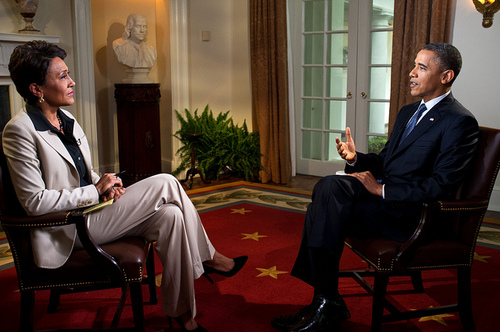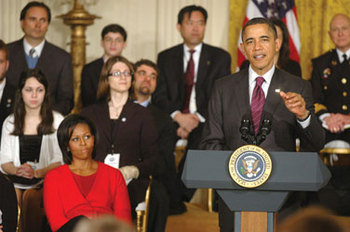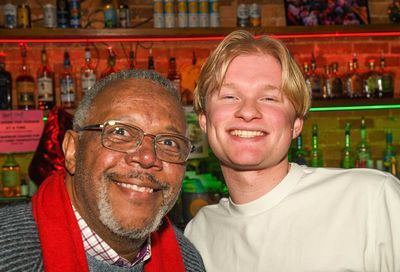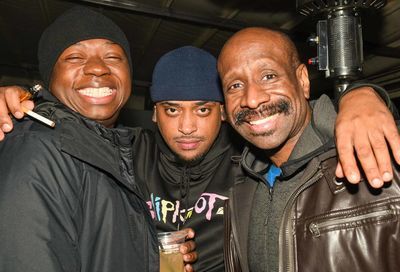 [Photo: ABC’s Robin Roberts talks with President Obama on May 9, 2012. (Photo by Pete Souza/The White House.)]
[Photo: ABC’s Robin Roberts talks with President Obama on May 9, 2012. (Photo by Pete Souza/The White House.)]
Much is being made — from Gawker to Mother Jones — of President Obama’s statement today that he believes marriage is a state issue.
Specifically, both pieces point to the line in the ABC News article about the interview: “The president stressed that this is a personal position, and that he still supports the concept of states deciding the issue on their own.”
As happened this past June when Obama spoke about marriage in New York, his comments tend to be read outside of the context of other actions being taken by the administration.
The context, however, turns the critical analysis on its head.
On Feb. 23, 2011, the Obama administration — through a letter written by Attorney General Eric Holder — announced that Obama and Holder had reached a decision that Section 3 of the Defense of Marriage Act was unconstitutional.
To reach that conclusion, the letter sent by Holder to House Speaker John Boehner (R-Ohio) first analyzed how classifications based on sexual orientation should be assessed under the equal protection clause of the Fourteenth Amendment (which is applied to the federal government through the Fifth Amendment).
Holder wrote, “the President has concluded that given a number of factors, including a documented history of discrimination, classifications based on sexual orientation should be subject to a more heightened standard of scrutiny.” Under the equal protection clause, laws classifying people are subjected to one of three levels of scrutiny – rational basis, intermediate scrutiny like that applied to sex-based classifications, or strict scrutiny like that applied to race-based classifications.
 With some level of heightened scrutiny applied to sexual orientation classifications, as Obama and Holder decided was appropriate based on their analysis of several factors considered when determining the level of scrutiny to apply, the decision that DOMA’s definition of marriage was unconstitutional was relatively straightforward. Department of Justice lawyers have since argued in federal cases from California to Massachusetts that heightened scrutiny should apply to sexual orientation classifications and that, accordingly, DOMA’s federal definition of marriage should be struck down as unconstitutional.
With some level of heightened scrutiny applied to sexual orientation classifications, as Obama and Holder decided was appropriate based on their analysis of several factors considered when determining the level of scrutiny to apply, the decision that DOMA’s definition of marriage was unconstitutional was relatively straightforward. Department of Justice lawyers have since argued in federal cases from California to Massachusetts that heightened scrutiny should apply to sexual orientation classifications and that, accordingly, DOMA’s federal definition of marriage should be struck down as unconstitutional.
Although being argued in the context of DOMA, however, the level of scrutiny to be applied to sexual orientation classifications would apply across the board — to federal, state and local laws, ordinances and practices.
In fact, on July 1, 2011, in Karen Golinski’s lawsuit seeking equal health insurance benefits for her wife as are offered to an opposite-sex spouse, DOJ filed a significant brief explaining the reasoning behind the Feb. 23, 2011, decision. In it, the administration acknowledged the significant role of both federal and state sexual orientation-based discrimination.
In the Golinski brief — and in several others since — DOJ lawyers spent multiple pages laying out the history of state-based discrimination against gay, lesbian and bisexual people.
It is here where Obama’s enunciated policy position — today and this past June — crosses the path of the legal pursuits of the administration.
If the administration were still defending DOMA and had taken no position on the level of scrutiny to be applied to sexual orientation classifications, then Obama’s statement might mean that his view is that states have unfettered rights to legislate as they they wish on marriage.
But, that is not the circumstances in which he makes these comments. Instead, Obama’s position now is three-fold: (1) he personally supports same-sex marriage; (2) he believes as a policy matter that state, and not federal, law should define marriages, as it always has been in this country; and (3) he believes that there are federal constitutional limitations on those state decisions.
It is true that the administration has not tidily wrapped those strands together. Doing so, by filing an amicus brief in a state marriage lawsuit like the challenge against California’s Proposition 8 would make this point clear to all.
But, even in the absence of such a public declaration, lawyers working on and judges considering these cases already have acknowledged the importance of the DOJ position on DOMA in state-law cases. The day that the DOJ decision was announced in February 2011, lawyers for the plaintiffs challenging Proposition 8 told the judge that the DOJ’s decision represented a “material,” or significant, development.
As the lawyers then wrote, “The conclusion of the United States that heightened scrutiny applies to classifications based on sexual orientation is unquestionably correct. Proposition 8 cannot survive the requirements of heightened scrutiny because its invidious discrimination against gay men and lesbians could not conceivably further an important government interest.”
As that brief — filed by Ted Olson, David Boies and the other lawyers representing those plaintiffs — makes clear, Obama’s legal, policy and personal views are not in any way contradictory and present a clear path forward toward the advancement of marriage equality across the country.
[Photo: Obama (Photo by Ward Morrison.)]


 With some level of heightened scrutiny applied to sexual orientation classifications, as Obama and Holder decided was appropriate based on their analysis of several factors considered when determining the level of scrutiny to apply, the decision that DOMA’s definition of marriage was unconstitutional was relatively straightforward. Department of Justice lawyers have since argued in federal cases from
With some level of heightened scrutiny applied to sexual orientation classifications, as Obama and Holder decided was appropriate based on their analysis of several factors considered when determining the level of scrutiny to apply, the decision that DOMA’s definition of marriage was unconstitutional was relatively straightforward. Department of Justice lawyers have since argued in federal cases from 

























